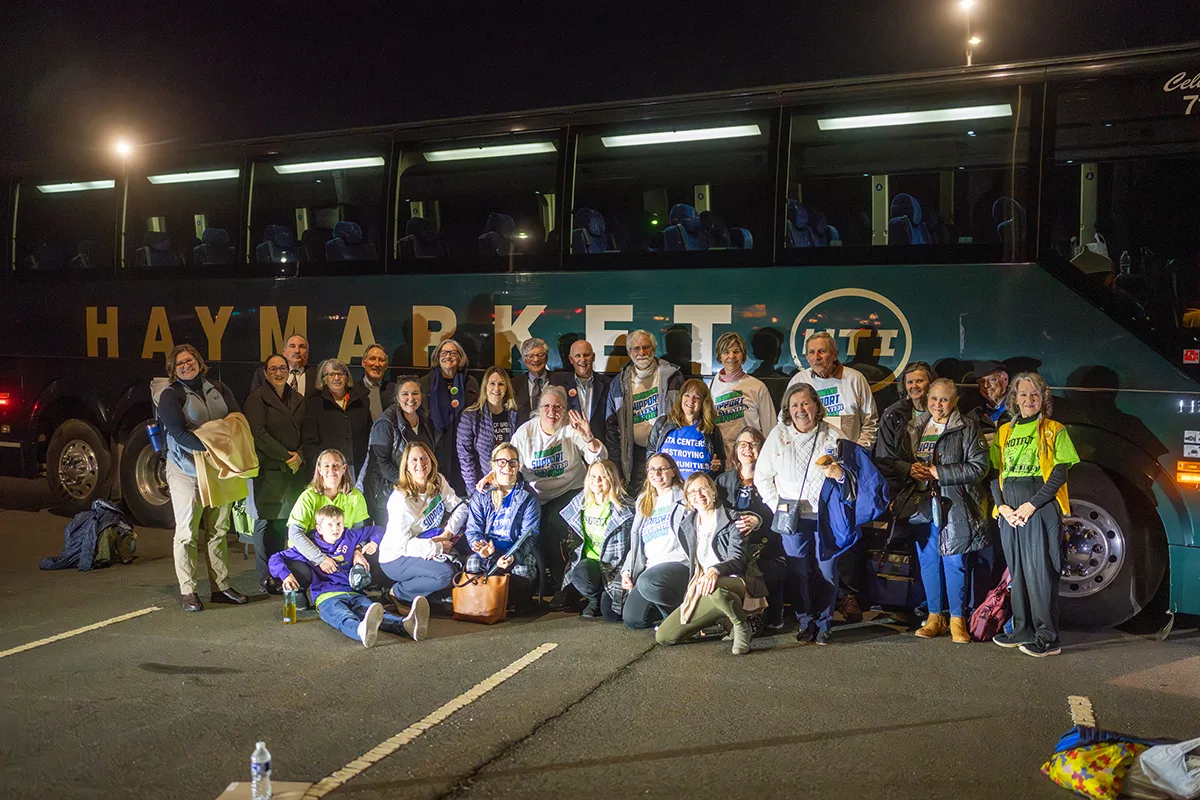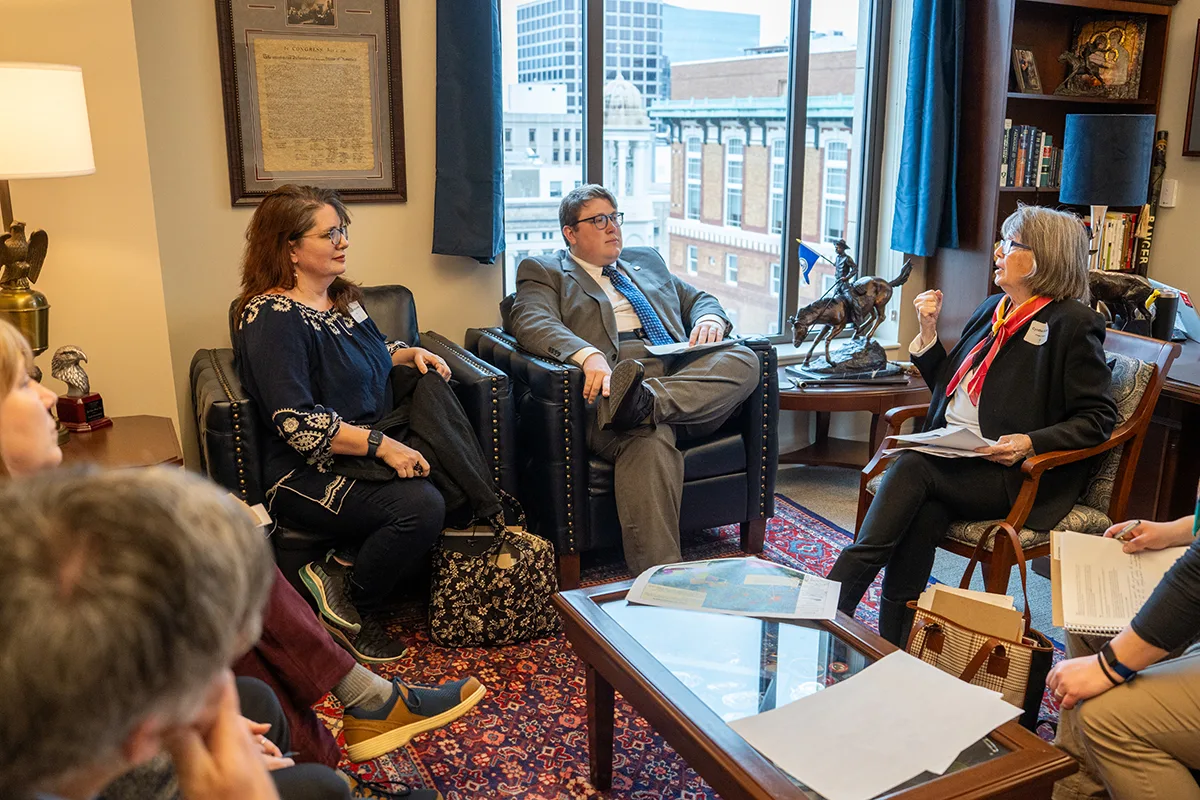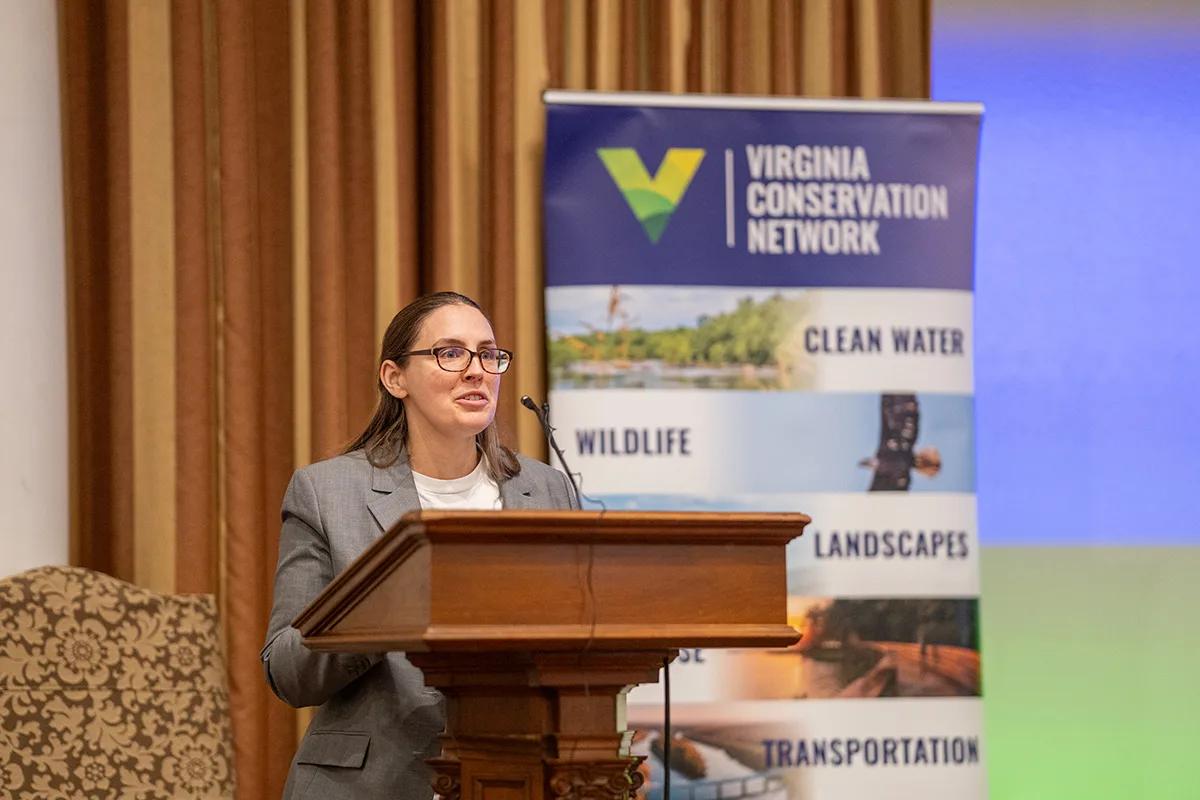Between our trip to Richmond to join Virginia Conservation Network’s Jan. 31 Conservation Lobby Day and our persistent efforts on behalf of the many conservation priorities before the General Assembly, this has been a very busy, and challenging, legislative session. Despite disappointments, the environmental community made some notable progress on a few key priorities.
Road Trip to Richmond for Data Center Reform
Working with the Coalition to Protect Prince William County and National Parks Conservation Association, we organized a bus trip for some 50 people from Northern Virginia to go down to Richmond for the VCN’s Conservation Lobby Day on Jan. 31. Leaving at 5 a.m. Armed with information, flyers, and advocacy t-shirts, these hearty people embarked on a day full of meetings with key decision makers, with an eye toward data center reform.
After opening comments from Sen. Danica Roem and Del. Josh Thomas, our group took a divide-and-conquer approach, meeting with more than 25 legislators throughout the day. We were recognized in the Senate Chamber by Sen. Roem, shared our story with a class of students touring the capitol, and testified on a data center bill that happened to be up in committee that day. Our ride home was filled with the mixed emotions of both celebration — of our success in sharing important information that amplified this issue among elected officials — and solemn acknowledgement that most of our legislators would not change course during this General Assembly session.
One bill we supported, HB 338 (Thomas), passed the House with amended language that watered-down what would have been a requirement that data center proposals include a site assessment of water usage and carbon emissions. It was continued to 2025 by the Senate.

Most of the 16 other pieces of legislation touching on our various data center reform goals, from modifying tax incentives to measuring energy demand and impacts on natural and historic resources, never made it out of their respective houses and were also continued to 2025. These bills were set aside in deference to a statewide study on data centers currently being conducted by the Joint Legislative Audit and Review Commission (JLARC), due to be completed in November 2024. JLARC is the highly respected research agency whose work informs the General Assembly’s legislative function. As JLARC conducts its research and engages all stakeholders, PEC staff and other members of the Virginia Data Center Reform Coalition will be providing our insights into the issue.
Although we support the study’s desired outcome to quantify the financial and environmental impacts of the data center industry on Virginia and Virginians, it should not have been a barrier to meaningful action on data centers this session. The longer the General Assembly delays, the greater the potential impacts on our electric rates, environment and communities — the growing impacts of which are well known to our regulators, agencies and utilities. Already, PJM, the organization that operates the regional electric grid, has recommended billions of dollars in new transmission infrastructure, the majority of it a direct result of data center development in Virginia.
Conservation, Renewable Power, Rural Roads, and Other Bills
Conservation Lobby Day was but just one day of many that PEC staff advocated on for a variety of legislative priorities, either remotely or in-person.
Funding for Virginia’s Outdoors
The Virginia Great Outdoors Act was a proposal to provide permanent, dedicated funding for conservation programs. It received bipartisan support and was broadly and enthusiastically received, with both the House Natural Resources Subcommittee and the Agriculture, Chesapeake, and Natural Resources Committee voting in favor to pass the bill. Unfortunately, it did not make it through the House Appropriations Committee. Our Virginia Outdoors, a bipartisan coalition promoting the outdoors for present and future generations, will continue its campaign into the next General Assembly session.
Progress on Community and Parking Lot Solar
Expansion of distributed and community-owned solar energy has been another major initiative for the conservation community. With so many thousands of acres of existing developed land, already engineered for stormwater management, the time is right to lessen solar energy’s impacts on “greenfields” by adding solar to the already-built and underutilized spaces like rooftops and parking lots. Two sets of bills move us in that direction by expanding shared solar into Appalachian Power territory and raising the capacity of shared solar in Dominion territory. Those bills, HB 106/SB 253 and HB 108/SB 255, have passed both houses and have moved to Gov. Youngkin for approval.
The Parking Lot Solar Development Pilot Program and Fund bill (SB234) passed out of the Senate with strong bipartisan support and a broad range of stakeholder support testimony. The House version (HB367) was tabled, and the Senate version of the bill was subsequently tabled in the House Appropriations Committee. However, the initiative was funded in the House budget through the appropriations process, and we now ask that the Senate budget find agreement with the House budget.

More Authority to Preserve Unpaved Roads
Virginia’s current funding system prioritizes paving for improving gravel roads. HB 74 and SB 644, patroned by Loudoun legislators Del. David Reid, De. Geary Higgins and Sen. Russet Perry, would clarify that gravel road improvements could include options other than paving, making it easier for localities to preserve these historic resources. Both bills passed their respective houses and have been advanced to the Governor’s desk for final approval.
Other Bills…
We followed and commented on a number of other bills, too many to cover in full. A few, however, made it through their respective chambers, including HB 109, which increases transparency in utility votes for PJM projects; HB 985 prohibiting use of toxic road sealants SB 276 authorizing the study of financing for rooftop solar; and SB 243, which establishes a PFAS Expert Advisory Committee.
We’re also happy to report that several bills we opposed or had serious concerns about were voted down or reduced in scope. SB 339, a bill that would have broadly allowed cryptocurrency mining in industrial areas has been reduced to a study. And SB 697 (VanValkenburg), which would have limited local government authority of the siting of utility-scale solar facilities, was carried over into 2025 without action.
By the time you read this, the General Assembly session will be over, but you can still talk to your legislators about these important issues. It is critical that our representatives know that the public is paying attention and appreciates their efforts. Writing and meeting with them during the off-season can even be the best opportunity to make your voice heard, because it’s free of the whirlwind of the General Assembly session.

This article appeared in the 2024 spring edition of The Piedmont Environmental Council’s member newsletter, The Piedmont View. If you’d like to become a PEC member or renew your membership, please visit pecva.org/join.
